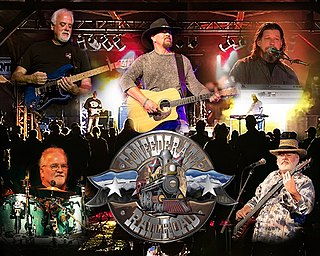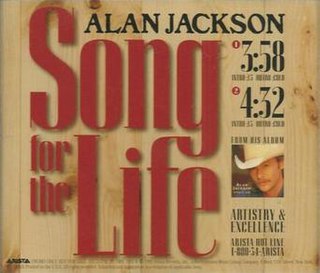
"Me and Bobby McGee" is a song written by American singer-songwriter Kris Kristofferson and originally performed by Roger Miller. Fred Foster shares the writing credit, as Kristofferson wrote the song based on a suggestion from Foster. A posthumously released version by Janis Joplin topped the U.S. singles chart in 1971, making the song the second posthumously released No. 1 single in U.S. chart history after "(Sittin' On) The Dock of the Bay" by Otis Redding. Gordon Lightfoot released a version that reached number 1 on the Canadian country charts in 1970. Jerry Lee Lewis released a version that was number 1 on the country charts in December 1971/January 1972 as the "B" side of "Would You Take Another Chance On Me." Billboard ranked Joplin's version as the No. 11 song for 1971.

Jerry Jeff Walker was an American country and folk singer-songwriter. He was a leading figure in the progressive country and outlaw country music movement. He was best known for having written the 1968 song "Mr. Bojangles".

"You Don't Know Me" is a song written by Eddy Arnold and Cindy Walker in 1955. "You Don't Know Me" was first recorded by Arnold that year and released as a single on April 21, 1956, on RCA Victor. The best-selling version of the song is by Ray Charles, who took it to number 2 on the Billboard Hot 100 chart in 1962, after releasing the song on his number 1 album Modern Sounds in Country and Western Music. The first version of the song to make the Billboard charts was by Jerry Vale in 1956, peaking at number 14 on the pop chart. Arnold's version charted two months later, released as an RCA Victor single, 47–6502, backed with "The Rockin' Mockin' Bird", which reached number 10 on the Billboard country chart. Cash Box magazine, which combined all best-selling versions at one position, included a version by Carmen McRae that never appeared in the Billboard Top 100 Sides listing.

Confederate Railroad is an American country rock band founded in 1987 in Marietta, Georgia, by Danny Shirley, Michael Lamb, Mark Dufresne (drums), Chris McDaniel (keyboards), Warren "Gates" Nichols, and Wayne Secrest. After serving as a backing band for outlaw country acts David Allan Coe and Johnny Paycheck, the band signed to a recording contract with Atlantic Records, releasing their self-titled debut album that year. In the 1990s, they released four more albums for Atlantic.

"My Second Home" is a song co-written and recorded by American country music singer Tracy Lawrence. It was released on September 16, 1993, as the third single from his album, Alibis. The song reached the top of the Billboard Hot Country Singles & Tracks chart and peaked at number 6 on the Canadian RPM Country Tracks chart. It was written by Lawrence with Paul Nelson and Kenny Beard.
"Who's Cheatin' Who" is a country music song written by Jerry Hayes and initially recorded by Charly McClain. It was the title track of her 1980 album for Epic Records, released in November 1980 as a single with "Love Scenes" on the B-side, and in early 1981, was her first Number One hit on the Billboard country charts. 17 years later, Alan Jackson had chart success with the song as well, with his cover version reaching number two on the same chart.

"Song for the Life" is a song written by American singer Rodney Crowell and originally recorded by The Seldom Scene. Crowell recorded the song in 1978 on his debut album Ain't Living Long Like This, and since then, the song has been covered by several other artists. One version, recorded by Alan Jackson, was released as a single in 1995, and was a Top Ten country hit for him that year. However, it has yet to be featured on any of his compilation albums.
"Callin' Baton Rouge" is a country music song written by Dennis Linde. The song has been recorded by multiple artists since its composition. It was notably recorded by American country singer and songwriter Garth Brooks whose version was a chart-topping single in the 1990s.
"Tonight I Climbed the Wall" is a song written and recorded by American country music artist Alan Jackson. It was released in January 1993 as the second single from his album A Lot About Livin' . It peaked at number 4 on both the United States Billboard Hot Country Singles & Tracks chart and the Canadian RPM Country Tracks chart. This broke a string of ten consecutive singles by Jackson that had peaked in the top 3 of Billboard's Hot Country chart.

"T-R-O-U-B-L-E" is a song written by Jerry Chesnut and recorded by Elvis Presley in March 1975. It was released as a single, as the A-side, with the B-side "Mr. Songman", through RCA Victor that was taken from his album Today. It is not to be confused with the Leiber and Stoller song "Trouble", that Presley first recorded in July 1958, and which was subsequently recorded by numerous other artists.
"Elvis and Andy" is a song written by Craig Wiseman, and recorded by American country music group Confederate Railroad. It was released in July 1994 as the second single from the album Notorious. The song reached #20 on the Billboard Hot Country Singles & Tracks chart.

"Queen of Memphis" is a song written by Dave Gibson and Kathy Louvin, and recorded by American country music band Confederate Railroad. It was released in December 1992 as the third single from their album Confederate Railroad. It peaked at number 2 in the United States, and number 3 in Canada. It is the band's highest-peaking single.
"'Till I Gain Control Again" is a country song written by Rodney Crowell and originally recorded by Emmylou Harris in 1975. The song was included on her 1975 studio album Elite Hotel. The song is most known by the No. 1 single version recorded by Crystal Gayle on her 1982 album, True Love.
"Come as You Were" is a song written by Paul Craft and first recorded by American country music artist Joe Stampley on his 1980 album After Hours. It was later recorded by American country pop music artist Jerry Lee Lewis in 1983 as a single from his album My Fingers Do the Talkin on MCA Records and it peaked at #66 on the country music charts.

"Sweet Music Man" is a song written and recorded by American musician Kenny Rogers. It appears on his 1977 album Daytime Friends, from which it was released as the final single.
"When You Leave That Way You Can Never Go Back" is a song written by Steve Clark and Johnny MacRae. The song—a bittersweet reflection of a condemned inmate's life, looking back at all the bridges he burned and wished could be repaired—was recorded by several country music artists, including Sam Neely, Bill Anderson and the band Confederate Railroad.
"Jesus and Mama" is a song written by Danny Mayo and James Dean Hicks, and recorded by the American country music band Confederate Railroad. It was released in July 1992 as the second single from the band's self-titled debut album. The song peaked at number 4 on the Hot Country Singles & Tracks charts in and was later included as the b-side to the album's third single, "Queen of Memphis."

Alan Jackson is an American country music artist. The first artist signed to Arista Nashville Records, he was with them from 1989 to 2011. He has released 15 studio albums, two Christmas albums, 10 compilations, and a tribute album for the label, as well as 67 singles.
"She's Gone Gone Gone" is a country music song written by Harlan Howard and originally recorded by American singer Lefty Frizzell. Frizzell's version of the song reached number 12 on the Billboard Hot Country Singles & Tracks chart.
"When and Where" is a song written by Jeff Pennig, Jess Brown and Brett Jones, and recorded by American country music group Confederate Railroad. It was released in May 1995 as the first single and title track from the album When and Where. The song reached #24 on the Billboard Hot Country Singles & Tracks chart.











